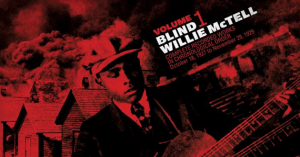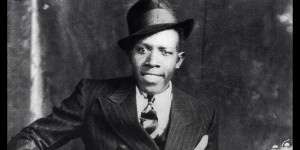Pre-War and Post-War Blues: Blues is often viewed in two time categories, pre-war and post-war. While this distinction, like any other, has its limits in organizing blues music, it does generally make some sense. Some artists did record both before and after World war II, but many only recorded either before or after the war. Recording slowed down greatly during the war itself, and there was a burst of activity after the war ended. The use of electric instruments corresponds with post-war blues and clearly adds a different dimension to the music.
JSP Label Pre-War Box Sets: The British JSP label has issued dozens of box sets of pre-war blues, jazz, and old-time music. Unfortunately this classic American music is mostly only reissued on foreign labels these days, but at least the JSP sets are relatively inexpensive, compared with some fairly pricey reissue CDs of pre-war blues from other foreign labels. Most JSP box sets are about the same price as two typical CDs.
Various Artists “Mississippi Blues: Rare Cuts 1926-41”
This 4-disc set includes lots of great pre-war Mississippi blues, including Son House’s “Clarksdale Moan” from 1930 that was found only in this century. An alternate take of Robert Johnson’s “Traveling Riverside Blues” is also included, but mostly this collection covers artists who are not as well-known as the “big names,” such as Johnson and House, as well as Skip James and Charley Patton. These players are every bit as impressive, though. A few of them, including Joe Calicott, Robert Lockwood, and J. D. Short (“Jelly Jaw Short” in pre-war days) recorded post-war, but most made their gems of music and were not heard from again. Both sides of the Mississippi Moaner’s only record are included. Garfield Akers’ “Dough Roller Blues” is actually only the second version of the famed blues song “Rollin’ And Tumblin'” and Bogus Ben Covington’s “Boodle-De-Bum Blues” was recently covered by The Carolina Chocolate Drops. William Harris, Cryin’ Sam Collins, Sam Butler, and many other wonderful but little-known artists are represented on this set.
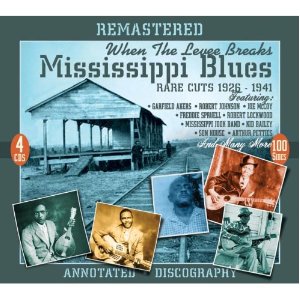
Various Artists “Big Joe Williams & The Stars Of Mississippi Blues”
5 discs full of great blues, including the early recordings of Big Joe Williams (1903-1982), of Crawford MS, who played jagged string-snapping blues on a 9-string guitar (at least on some of his records) and exhibits a youthful spontaneity in these recordings not quite equaled on his excellent post-war records. The set also includes classics by Tommy McClennan who did the original “Cross Cut Saw.” Also in the set, songs by Robert Petway who recorded “Catfish Blues” in 1941, the song better-known as “Rollin’ Stone” after Muddy Waters cut it in 1950. The collection is rounded out with songs from David “Honeyboy” Edwards, who was a companion of Robert Johnson, and Willie “Poor Boy” Lofton whose set includes the great version of “Dark Road Blues” (previously known as “Big Road Blues” and “Stop And Listen”) that he cut in the mid-1930s.
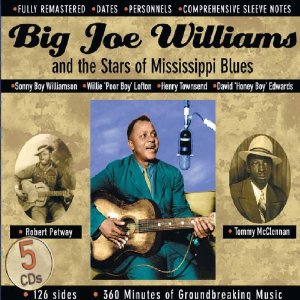
Various Artists “Legends of Country Blues”
5 discs with recordings of some of the biggest name artists in early Mississippi Blues, including all of Skip James’ 1931 recordings for Paramount Records, early Son House cuts from Paramount, and House songs recorded by Alan Lomax in 1941 for The Library Of Congress. You’ll also find early sides of Bukka White (Booker T. Washington White) including his classic “Parchman Farm” about Mississippi’s infamous prison (where both he and House did time) and “Panama Limited.” White, House, and James all took part in the folk revival in the 1960s. This box set also includes two great Mississippi artists who did not record after World war II, Tommy Johnson and Ishman Bracey. Among Johnson’s well-known songs is the “Canned Heat Blues” that named a band in the 1960s and describes drinking “canned heat” (Sterno) to get high, which is definitely not recommended, though this box set most certainly is.
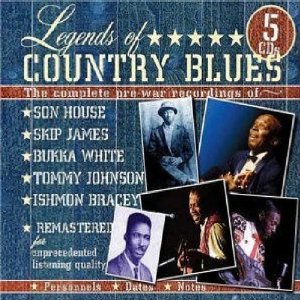
Son House (1902-1988) was the major influence to both Robert Johnson and Muddy Waters. He recorded in the 1930s for Paramount Records, in the 1940s for Alan Lomax/Library Of Congress, and later during the 1960s for Columbia and other labels. His haunting voice and raw guitar-playing are absolutely matchless. Son House’s 1930s recordings (except fot two sides found in this century) plus most of his Library Of Congress recordings are on “Legends of Country Blues” listed above. They can be found other places; for instance, House’s Library Of Congress recordings are found on “The Complete Library of Congress Sessions, 1941-1942” from the Travelin’ Man label, but the price for it approaches that of the 5-disc “Legends Of Country Blues” set listed above which includes all of those tracks plus so many more. The 1965 album “Father Of The Delta Blues: The Complete 1965 Sessions” on the Columbia/Legacy label is House’s most significant work from the folk revival years, including the song “Death Letter Blues” that mesmerized audiences when he performed it in the 1960s. Another album of interest is the double CD “Son House In Seattle 1968” from Arcola Records. One disc is a concert recording from that year full of stories as well as songs, the true Son House concert of the folk revival years, while the other mixes an interview with him and music from artists he knew, worked with, and learned from, including his long-time friend Willie Brown, and Rube Lacy who was a major influence to him.
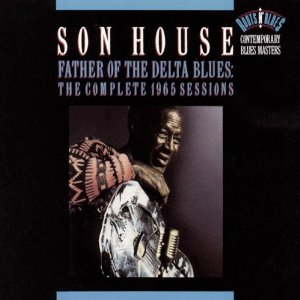
Charley Patton (1887?-1934) became a popular blues musician in the 1920s when he lived at Dockery plantation near Ruleville MS. His rough-hewn, jagged blues was a major influence to Howlin’ Wolf, as well as Robert Johnson, and his pals in both music and life included Willie Brown and Son House. Wolf covered Patton’s “Pony Blues” and Linda Ronstadt’s first recording group, The Stone Poneys, derived its name from Patton’s “Stone Pony Blues.” There are a number of sets of Patton’s music.
The over-the-top deluxe box set “Screamin’ And Hollerin’ The Blues: The World Of Charley Patton” includes all of Patton’s sides plus everything recorded on the same dates in the same studios he was in by other artists, such as Willie Brown, plus a book on Patton by John Fahey and lots of art, photos, and essays. This set is quite pricey.
“Complete Recordings 1929-34” from JSP Records is an affordable 5-disc box that covers Patton’s output. “The Best Of Charlie Patton” from Yazoo Records is a great selection of Patton’s work but the JSP box set is less than double its cost.
Also see: Pristine Audio Recordings (below)
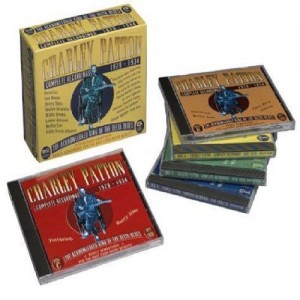
Robert Johnson (1911-1938), famous posthumously, was pretty obscure during his life. The box set “Robert Johnson: The Complete Recordings” from 1990 actually appeared on the Billboard charts. “The Centennial Collection” is an update of that box with new photos, art, and essays, and all the songs as well.
The two sets “King of the Delta Blues Singers” Vol. 1 and Vol. 2 might seem extraneous given these complete recording reissues, but the sound quality on these single CDs, especially Vol. 2 is generally regarded as better than on the Complete Recordings box, though the Centennial Collection also sounds better than the original 1990 box.
Also see: Pristine Audio Recordings (below)
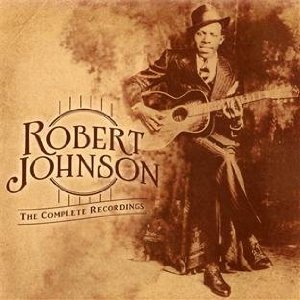
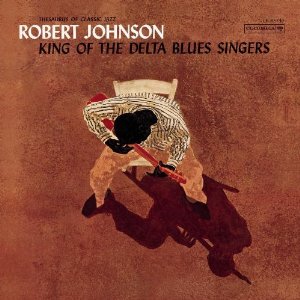
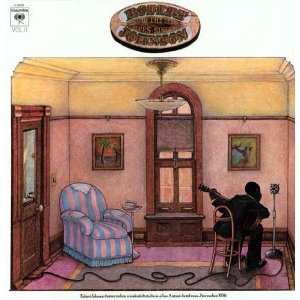
Skip James (1902-1969) is the most well-known practitioner of the “Bentonia” style. Bentonia is not in the Delta, though on some albums James has been called a “Delta Blues Singer.” James had a high, eerie voice, and played both guitar and piano with a distinct signature sound. He recorded for Paramount in 1931, and was rediscovered in the 1960s, playing at folk festivals and blues festivals. He died of cancer in Philadelphia PA and is interred in Bala Cynwyd PA.
James’ 1931 output can be found on several reissues, including the excellent box listed above “Legends Of Country Blues,” though the best audio is probably that from the Pristine Audio reissue “Yola My Blues Away.” The songs are also collected on a Yazoo label CD “Complete Early Recordings.”
Postwar recordings include the excellent “Skip James Today!” from Vanguard, and also from that label his album “Skip James (Vanguard Visionaries).” “Skip’s Piano Blues” from Genes Records focuses on his post-war piano work, which, excellent though it is, is usually overlooked by the guitar-obsessed post-rock fans.
Also see: Pristine Audio Recordings (below)
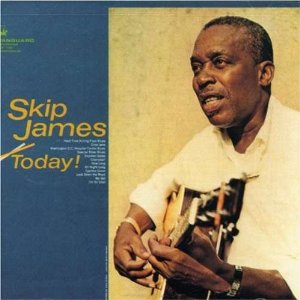
Mississippi John Hurt (1893?-1966) offered a gentle, soothing blues, completely opposite from Charley Patton’s gravel-voiced music. He recorded in 1928 and then was rediscovered in the 1960s and enjoyed success onn the folk revival circuit.
“1928 Sessions” from Yazoo Records covers his pre-war recordings, though the best audio for these is definitely the album from Pristine Audio “The Man From Avalon.”
“Mississippi John Hurt Today” is a fine collection of 1960s recordings from Vanguard Records, and the box set from Vanguard “The Complete Studio Recordings Mississippi John Hurt” is a good deal as well.
The albums “DC Blues: Library of Congress Recordings” and “The Library Of Congress Recordings Vol. 2 Disc. 2” are excellent sets recorded right after he was rediscovered in 1963.
Also see: Pristine Audio Recordings (below)
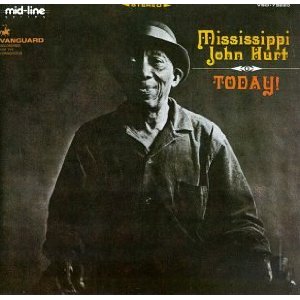
Mississippi Fred McDowell (1904-1972)
Fred McDowell played, but did not record, before World War II. His slide guitar work and mesmerizing sound was a major influence to the “hill country” sound of artists such as R. L. Burnside. On his album “I Do Not Play No Rock ‘N’ Roll” he says that he just plays “the straight and natural blues,” though ironically some people actually objected to his use of an electric guitar and the subtle presence of a bass player and drummer. “Long Way From Home” from Milestone is a great collection of McDowell stuff, played solo as he usually played. “Downhome Blues 1959” from JSP is another fine set and includes Forest City Joe and others. McDowell’s collaboration with harmonica player Johnny Woods on the album “Mama Says I’m Crazy” from Fat Possum Records is also a winner.

Muddy Waters (1913-1983) born McKinley Morganfield near Rolling Fork MS is best-known for the classic songs he cut for Chess Records and later for various divisions of the Columbia label, but his first recordings were actually made in Mississippi and are collected on “The Complete Plantation Recordings” (now available on the Chess imprint) recorded in 1941 and 1942 at Stovall’s Plantation in Clarksdale, MS. Included are interviews done by Alan Lomax. When Muddy heard his voice on record from these recordings, he decided to try for a career in music! Perhaps he never would have done it without these sessions.
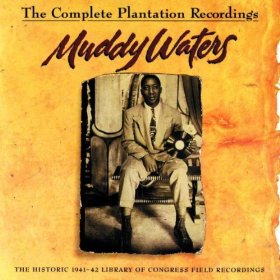
John Lee Hooker (1917-2001) was one of the most extensively recorded blues players. His idiosyncratic and improvisational approach was surprisingly successful when he moved to Detroit from Clarksdale MS, and recorded for the first time after World War II. Hooker varied his tempo and meter at will, and mixed singing and talking. Not everyone was a fan. Buddy Guy reports in his book “When I Left Home” that blues song-crafter Willie Dixon didn’t “get” Hooker at all. Hooker’s earliest recordings, found on a four-disc box from JSP called “Classic Early Years 1948-51,” still sound fresh today.
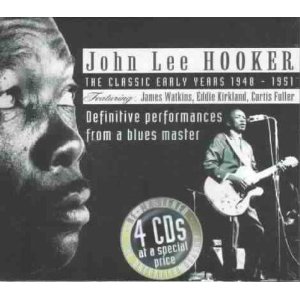
Elmore James (1918-1963) was an inspired slide guitarist and singer from Canton MS famous for “Dust My Broom” which he recorded for the first of many times in Jackson MS for the Trumpet label in 1951. He died just ever too soon to be rediscovered and to enjoy success in the folk-blues revival years of the mid-to-late 1960s. “The Classic Early Recordings: 51-56” (Ace Records, UK) is an excellent three-disc set of some of his best work.
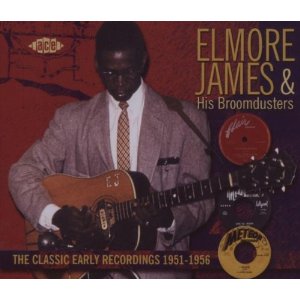
Denise LaSalle (1939-) of Belzoni MS is one of the leading figures in southern soul-blues, both as a singer and a songwriter. Among her many classic songs detailing the battle of the sexes is “Your Husband Is Cheating On Us.” “Right Place Right Time” (Malaco label) is a great example of her abilities. “On the Loose/Trapped By a Thing Called Love” (Westbound,UK) a great double album offering on one CD, includes her big hit “Trapped By A Thing Called Love.”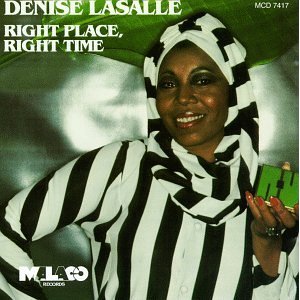
Jessie Mae Hemphill (1923–2006) was a north Mississippi blues singer born near Como, MS. She played guitar and drums and performed with fife and drum bands led by her grandfather Sid Hemphill, though she was little-known outside of her community until recording in 1979 for the High Water label (she had recorded earlier, in 1967, in field recording sessions for ethnomusicolgist George Mitchell). Her album “She Wolf” in 1981 made a splash in France. In 1990 her American release “Feelin’ Good” bolstered her career in the U. S. She-Wolf and Feelin’ Good are now reissued on the Shout Factory label.
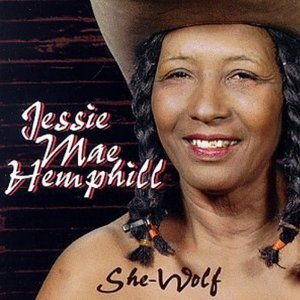
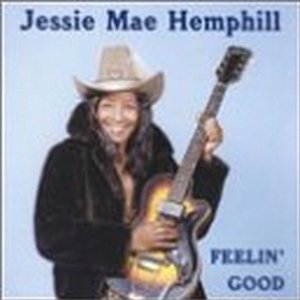
R. L. Burnside (1926-2005) was a blues musician from Holly Springs MS whose music was only of local interest for many years. His earliest acclaim was among blues aficionados only, many of them overseas where his songs were issued on the Dutch Swingmaster label, now reissued on a CD “First Recordings” from Fat Possum Records. Other albums of special interest include “Come On In” from Fat Possum and “A Ass Pocket Of Whiskey” also from Fat Possum, where his traditional hill country blues is transformed by modern hip hop sensibility, and, on the latter album, by a post-progressive blues rocker Jon Spencer. More traditional sounds of his are included on “Mississippi Delta Blues: Blow My Blues Away, Vol. 2” from Arhoolie Records that includes Joe Calicott and Houston Stackhouse as well. His live “Burnside On Burnside” album from Fat Possum features his grandson Cedric Burnnside on drums in a sizzling set.
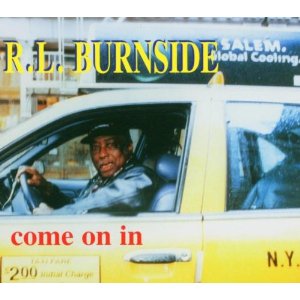
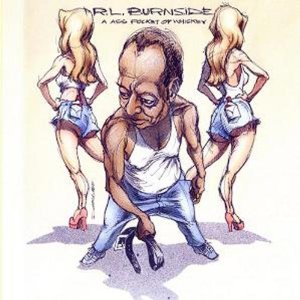
Junior Kimbrough (1930-1998) of Hudsonville MS played a hypnotic kind of hill country blues featured prominently in the 1992 film “Deep Blues” where he was recorded in his own juke joint. “You Better Run: The Essential Junior Kimbrough” from Fat Possum Records is a good collection.
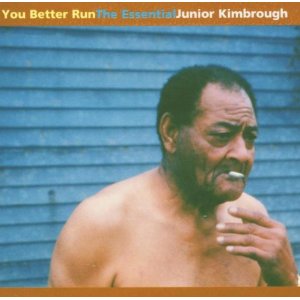
Music from Artists in the Mississippi Blues Project Concert Series:
Cedric Burnside:
Cedric Burnside Project “The Way I Am” 2011 album self-produced, hip hop infused hill country blues
Burnside Exploration “The Record” (Lucky 13 Records) 2009 hard-hitting modern blues
Big George Brock:
“Club Caravan” 2005 (Cat Head Delta Blues & Folk Art label), a potent album with the force of Muddy and Wolf
“Live At Seventy Five” (Cat Head Delta Blues & Folk Art label) live blues from Ground Zero in Clarksdale MS
Super Chikan:
“Blues Come Home To Roost” (Rooster Blues 1997) Super Chikan’s debut album full of fun and social commentary
“Sum Mo Chikan” (Chikan Howse Records) more of Chikan’s unique songwriting
Homemade Jamz Blues Band:
“Pay Me No Mind” (Northern Blues label) 2008 debut for this dynamic family band from Tupelo MS
“Game”(CD Baby) on their third album the band continues to be exciting and fresh
Terry “Harmonica” Bean:
M For Mississippi – A Road Trip Through The Birthplace Of The Blues (Music From The Motion Picture) soundtrack
M For Mississippi: A Road Trip Through The Birthplace Of The Blues (More Music From The Motion Picture) soundtrack
“We Juke Up In Here” soundtrack album (Cat Head Delta Blues & Folk Art label)
Jimmy “Duck” Holmes:
“Back To Bentonia – 5th Anniversary Deluxe Edition” (Broke & Hungry label 2011) Bentonia style blues with Bud Spires on harmonica and the late great drummer Sam Carr.
Robert “Wolfman” Belfour:
“What’s Wrong With You” (Fat Possum label)
“Pushin’ My Luck” (Fat Possum label) two albums of solid blues that draws from the hill country the delta, and more
Anthony “Big A” Sharrod
“We Juke Up In Here” soundtrack album (Cat Head Delta Blues & Folk Art label)
Pristine Audio Recordings: The Pristine Audio label in France is run by a British sound engineer, Andrew Rose, who has coaxed the best possible sound out of many vintage recordings using modern technology and lots of “digital elbow grease.” Rose’s main focus is classical music, but he offers a few blues and jazz titles too. You can buy a CD from the label, but it will cost a lot more than the downloads offered, which include high-quality mp3 files, or flac files, which are lossless files, as good as CDs, and can be converted and burned to a CD on your computer.
:
Pristine Audio reissues of interest
Mississippi John Hurt “The Man From Avalon”
Robert Johnson “Legendary Blues”
Robert Johnson “Legendary Blues, Vol. 2”
Charley Patton “Dirt Road Blues”
Skip James “Yola My Blues Away”
The two Johnson albums cover his full output. The Skip James album includes all of his pre-war recordings. The John Hurt album covers his pre-war recordings and offers the first-ever speed-corrected reissue of “Frankie.” These are scratchy pre-war recordings, but the audio quality achieved here is probably better than on any other reissues of this same material.
